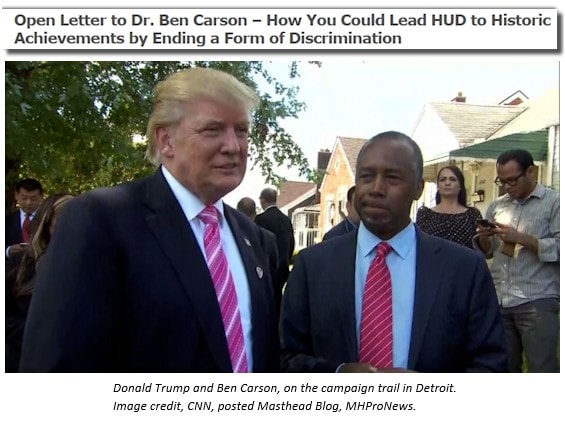
In an op-ed by Robert Romano, Senior Editor at Americans for Limited Government, addressed three ways that incoming HUD Secretary Ben Carson could end public housing at the Department of Housing and Urban Development (HUD).
To set the stage for Romano’s column, recall that in selecting Carson for the role of HUD Secretary, President-elect Donald Trump said the following:
“Ben Carson has a brilliant mind and is passionate about strengthening communities and families within those communities. We have talked at length about my urban renewal agenda and our message of economic revival, very much including our inner cities. Ben shares my optimism about the future of our country and is part of ensuring that this is a Presidency representing all Americans. He is a tough competitor and never gives up.”

Daily Business News readers should note too that public discussion among Democrat leaders is that eight of Trump’s picks for cabinet positions will be targeted during the confirmation process, but Carson is not on that list.
“So, with the idea of urban renewal and overall economic revival, just what can Carson do to reform the current nation’s public housing?” asked Romano in his op-ed in the Sun Prairie Star.
“How about by eliminating it?”
Romano cites that Carson could make privatizing mortgage giants, Government Sponsored Enterprises (GSEs) Fannie Mae and Freddie Mac, which were placed in conservatorship under the Federal Housing Finance Agency (FHFA) since 2008 after the financial crisis a top priority.

“Carson in his capacity will sit on the Federal Housing Finance Oversight Board, which advises the FHFA,” said Romano.
“One notable pick to the Trump transition team was American Enterprise Institute scholar Edward Pinto to the Federal Housing Finance Agency landing team. Pinto is a former chief credit officer at Fannie Mae. If anybody knows a thing or two about not only the GSEs, where he worked, but the financial crisis and how to prevent another one, it is Pinto. It was Pinto who penned the forensic audit of the GSEs in 2010 that outlined the primary causes of the financial crisis, including the concentration of $1.8 trillion of high risk mortgages at the GSEs.”
Romano next points to public housing.
“Carson might also set his sights on the 1.1 million households living in public housing units, and privatizing that, too. Carson, who grew up in inner city Detroit, would be well familiar with the challenges faced the nation’s inner cities,” said Romano.

“For ideas on improving conditions, Carson need look no further than Poland, Hungary, Slovakia and Romania in the late 1980s when the Soviet Union was falling apart, where public housing was rapidly privatized with great effect. The plan decentralized housing policy from national to local control, and critically, turned over ownership of state-run housing units directly to the people who lived in the units under extremely favorable terms.”
A move in this direction, according to Romano, opens up additional opportunities.
“As the units were privatized, turning title directly over to the tenants, it instantly created a private market for that housing. The owners could sell, but many of them chose to rent, and instantly had long-lasting incomes generated. It was a win-win. The same thing could be done in the federal and state government-owned housing units here in the U.S., creating a real stake by residents in urban renewal, and generating a new market for housing and refurbishing the existing stock. This will create economies where there were none, and opportunities to those who need it the most.”
As a final point, Romano suggests that Carson look at some Obama era regulation.

“Carson might also want to take a look at rescinding an Obama era regulation, ‘Affirmatively Furthering Fair Housing’ (AFFH) currently conditions $3 billion of yearly community development block grants on 1,200 recipient cities and counties rezoning neighborhoods along income and racial guidelines. The rule directs municipalities “to examine relevant factors, such as zoning and other land-use practices that are likely contributors to fair housing concerns, and take appropriate actions in response” as a condition for receipt of the block grants,” said Romano.
“This is massive overreach by the federal government, and basically puts bureaucrats in Washington, D.C. in charge of determining if neighborhoods are too racially divided or not. In the meantime, it ignores the reality that people choose where they live, by buying or renting, and based on where their employment opportunities.”
In closing, Romano makes a very strong statement to the potential future for Carson.
“If Carson did just those three things, he would be the most free market and successful Secretary of the Department of Housing and Urban Development in U.S. history, by getting the government out of the business of choosing winners and losers in housing finance, empowering individuals to have a greater stake in their communities and ending the federal government’s public housing failure once and for all.”

For detailed coverage of the nomination of Dr. Ben Carson as HUD Secretary, including an open letter from MHProNews and MHLivingNews publisher L.A. “Tony” Kovach, click here. ##
(Image credits are as shown above.)

Submitted by RC Williams to the Daily Business News for MHProNews.

























